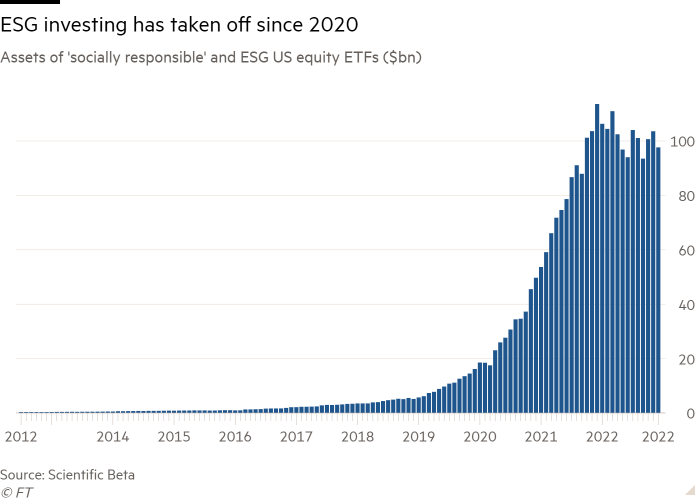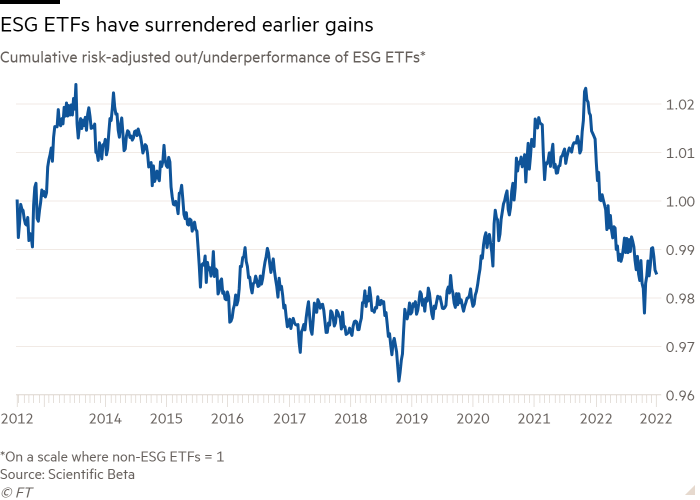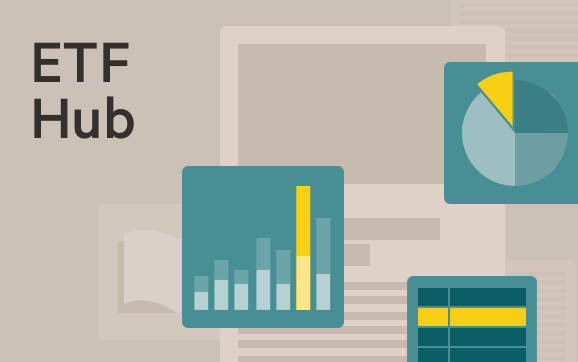ESG ETFs fail to shine over past 10 years

Simply sign up to the Exchange traded funds myFT Digest -- delivered directly to your inbox.
Latest news on ETFs
Visit our ETF Hub to find out more and to explore our in-depth data and comparison tools
Exchange traded funds investing on the basis of environmental, social and governance criteria have not beaten the market over the past decade, analysis has shown.
The findings come despite widespread claims since 2020 that ESG is able to deliver outperformance by steering investors away from poorly run and heavily polluting companies and towards the “winners” of the future.
Analysis by Scientific Beta, an index provider and consultancy linked to the Edhec-Risk Climate Impact Institute, suggests that 2020 was a “statistical outlier” and, if anything, ESG ETFs have marginally underperformed their traditional peers.
“‘Real-world’ ESG performance is unremarkable, with no evidence of sustainable ETFs outperforming,” Felix Goltz, research director at Scientific Beta said.
“Quite often it’s suggested there should be some outperformance. [People say] ‘they are better businesses, they are going to generate higher returns’. That’s clearly not something we see in the data.”
Alex Edmans, professor of finance at London Business School, who is unconnected to Edhec’s yet to be published, Sustainability Alpha in the Real World: Evidence from Exchange Traded Funds, said it “does a good job of highlighting the folly in simple claims like ‘ESG investing outperforms, period’ but these claims should have never been made in the first place as they were based on short-time series with inadequate controls. Unfortunately, they are lapped up uncritically due to confirmation bias.”
Scientific Beta crunched data on every US equity ETF domiciled in either North America or Europe and categorised by Bloomberg as either “socially responsible” or ESG, from 2012 to the end of 2022. These ETFs had assets of $97.6bn at the end of the period, having peaked at $114bn in December 2021.

The paper is relatively unusual in being based on real-world data, weighted by the popularity of individual ETFs, rather than being based on more theoretical strategies.
It found that average annual returns for ESG ETFs were 0.2 percentage points lower than for comparable non-ESG ETFs.
This undershoot fell to 0.1 points when returns were adjusted for the market risk exposure of portfolios. However, the annual underperformance increased to 0.7 percentage points when industry factors’ contributions were removed, balancing the sector weights between the two universes.
“Over the past decade, the sustainable investing portfolio did not outperform its benchmarks. If anything, realised returns were marginally lower than its benchmarks,” the paper said.
The analysis did find that sustainable funds outperformed 4.2 percentage points in 2020. However, this was more than outweighed by underperformance in other years, and even 2020’s strong showing was mostly due to sector biases, with ESG funds typically overweight technology and underweight energy.
“A lot of people who invest in ESG declared victory in 2020 when ESG did have strong performance,” Goltz said. “That was an outlier. That hasn’t left any [overall] outperformance, and most of that you can explain with sector biases.”

The small underperformance identified by the research could be partially due to fee differentials: with a median annual expense ratio of 20 basis points for the ESG ETFs, compared to 10bp for the non-ESG funds, according to Goltz.
The paper did, though, dispel any criticism that ESG funds are merely “index-huggers” — charging more for portfolios that are little different to the underlying market. It found that ESG vehicles do demonstrate substantial tracking error from the mainstream indices, potentially allowing them to outperform, but were unable to pick the winners from the losers.
“There is enough potential to substantially deviate from the benchmark. In other words, there is nothing . . . that would bias the relative performance of the sustainable investing portfolio towards zero,” the study added.
The existence of this tracking error should at least give some reassurance to those who invest in ESG strategies purely for non-financial reasons.
Edmans agreed with the findings but said it was “not clear what strategies the ESG ETFs are pursuing”.
“Many ETFs pursue quantitative strategies, such as investing in stocks with high ESG ratings. However, true ESG investing involves fundamental, qualitative analysis — truly understanding a company rather than just following an ESG rating,” he said.
“It is not surprising that such simple strategies don’t beat the market, as anyone can follow such strategies; to get an edge and beat the market, you need to conduct analysis and obtain insights that no one else is conducting.
“I’d argue that many sustainable ETFs don’t actually pursue sustainable investing, which involves going beyond the numbers and undertaking a deep grassroots analysis of a company,” Edmans added.
Latest news on ETFs

Visit the ETF Hub to find out more and to explore our in-depth data and comparison tools helping you to understand everything from performance to ESG ratings
Andrew Clare, professor of asset management at Bayes Business School, believed the world was still only partway through a transition period during which ESG stocks should outperform, only to underperform in the following period.
“Suppose we live in a world where investors don’t care about sustainability (high ESG scores) one day, and then wake up the next day suddenly caring about this issue. In this world we could expect the expected return on stocks with high ESG credentials to fall with this realisation, since they now represent a perceived lower risk. For this to happen their share prices have to rise,” Clare said.
“So, when we look back we see stocks with high ESG scores outperforming stocks with low ESG scores as we transition to a world that cares about the planet/society/governance. This transition period is probably still under way. But when it is finished, in the short to medium-term investors could expect lower returns from stocks with higher sustainability credentials,” he added.
Comments